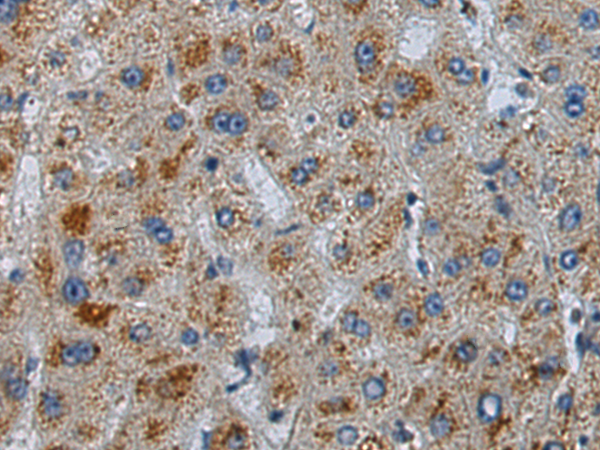

| WB | 咨询技术 | Human,Mouse,Rat |
| IF | 咨询技术 | Human,Mouse,Rat |
| IHC | 1/100-1/300 | Human,Mouse,Rat |
| ICC | 技术咨询 | Human,Mouse,Rat |
| FCM | 咨询技术 | Human,Mouse,Rat |
| Elisa | 1/5000-1/10000 | Human,Mouse,Rat |
| Aliases | CALP; KCHIP4 |
| WB Predicted band size | 29 kDa |
| Host/Isotype | Rabbit IgG |
| Antibody Type | Primary antibody |
| Storage | Store at 4°C short term. Aliquot and store at -20°C long term. Avoid freeze/thaw cycles. |
| Species Reactivity | Human, Mouse, Rat |
| Immunogen | Fusion protein of human KCNIP4 |
| Formulation | Purified antibody in PBS with 0.05% sodium azide and 50% glycerol. |
+ +
以下是3篇关于KCNIP4抗体的参考文献概览:
---
1. **文献名称**: *KChIP4a regulates synaptic plasticity and memory by controlling Kv4 channel complexes*
**作者**: Zhou, W., et al.
**摘要**: 研究利用KCNIP4抗体通过免疫组织化学和Western blot技术,发现KCNIP4a亚型通过调控Kv4钾通道复合体影响海马神经元的突触可塑性和记忆形成,为认知障碍疾病提供了潜在机制解释。
---
2. **文献名称**: *Differential expression of KCNIP4 isoforms in murine heart and brain*
**作者**: Anderson, C.L., et al.
**摘要**: 通过特异性KCNIP4抗体分析不同组织中的蛋白表达,发现心脏和大脑中KCNIP4存在显著亚型差异,提示其在不同器官中可能通过调控钾离子通道发挥独特生理功能。
---
3. **文献名称**: *KCNIP4 as a biomarker in Alzheimer's disease: A proteomic approach*
**作者**: Kim, S., et al.
**摘要**: 采用KCNIP4抗体对阿尔茨海默病模型小鼠脑组织进行蛋白质组学分析,发现KCNIP4表达水平与淀粉样斑块沉积呈负相关,提示其可能作为神经退行性疾病的潜在生物标志物。
---
**提示**:若需获取全文,建议通过PubMed或ResearchGate输入标题查询,部分文章可能提供开放获取。
KCNIP4 (Kv Channel-Interacting Protein 4) is a member of the neuronal calcium sensor family that modulates voltage-gated potassium channels (Kv4), particularly in regulating their surface expression and gating properties. It is predominantly expressed in the brain, including regions like the hippocampus, cortex, and cerebellum, where it influences neuronal excitability, synaptic plasticity, and signal transduction. Dysregulation of KCNIP4 has been implicated in neurological disorders such as Alzheimer’s disease, epilepsy, and schizophrenia, highlighting its role in maintaining neural circuit stability.
Antibodies targeting KCNIP4 are essential tools for investigating its expression, localization, and function in both physiological and pathological contexts. These antibodies are typically developed using immunogenic peptides or recombinant protein fragments, validated through techniques like Western blotting, immunohistochemistry, and immunofluorescence. Specificity is confirmed using knockout controls or siRNA-mediated knockdown. Researchers employ KCNIP4 antibodies to study its interaction with Kv4 channels, calcium-dependent signaling pathways, and its potential as a biomarker or therapeutic target. Commercial availability of these antibodies has facilitated advances in neurobiology, though batch variability and cross-reactivity with homologous proteins (e.g., KCNIP1-3) require careful experimental validation.
×